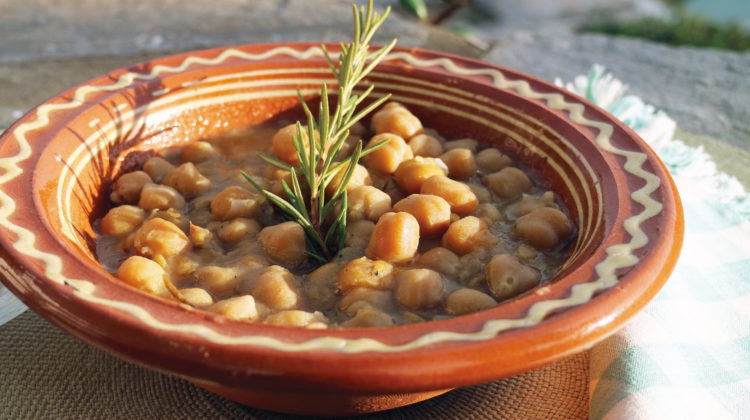
My friend from Lefkes, Petros Kantelis, gave me the recipe and instructions for chickpeas roasted in a skountavlo, the way they are traditionally cooked in the village of Lefkes on Paros Island, commonly known as chickpea soup (revithada) of Paros.
He stressed that, for having a successful result, the necessary ingredients are: care and love.
Petros cooks chickpeas for the largest local folk festival of Paros, the popular Festival of Karavolas, celebrated in Lefkes, the mountainous village of Paros on the first Saturday after the 15th of August.
The event is organised by the cultural association named M.E.E.A.S. “YRIA OF LEFKES”.
A skountavlo is a magical earthenware pot made from terracotta (earth) baked at high temperatures, a clay crock pot. Crock pots were the first cooking vessels created by man and are found in excavations all over the world.
Cooking in a skountavlo is done slowly and patiently. With heat, steam and minimal liquids the contents come together, aromas and ingredients mix at the ultimate degree and, together with cooking in a wood-fired oven, they acquire a unique, slight smokey flavour. This is an ideal dish for cooking almost everything from meat to vegetables and soups. A skountavlo is a kind of casserole pot, glazed or not internally, wide at the bottom, and narrow at the top, it has a lid and two symmetrical handles and is shaped with modest red clay.
The dish is found in many regions of Greece, but is named differently from place to place.
In the island of Sifnos it is known as skepastaria, while in Paros it maintained its ancient name.
Cultivating chickpeas in the Aegean islands is easy as the plant has adapted to the warm and arid landscape. In Paros especially, chickpeas had been widely cultivated in the past,
but today are rarely found on the island. Fortunately, there are very good chickpeas in the rest of Greece.
The recipe, primal and basic, crockery, fire, rainwater, sea salt, olive oil, chickpeas, care and love.
Ingredients:
Procedure
Put the chickpeas into a bowl of water and leave to soak overnight with 1 tablespoon of baking soda and 1 tablespoon of salt.
The following morning, rinse the chickpeas and put them into the skountavlo together with coarsely diced onion, the bay leaves, the rosemary sprigs, olive oil and pepper. Add water until the chickpeas are covered and stir.
Cooking in the wood-fired oven
Light the wood and when the flames lower in intensity cover the skountavlo and put the chickpea soup (revithada) into the wood-fired oven and roast slowly for approx. 6 hours. In the meantime, if needed, add a little boiling water.
When ready, take out of the oven, season if necessary and serve at room temperature.
Cooking in the electric oven
Cover the skountavlo and place in a preheated oven at 200°C. When it starts to boil, roughly an hour later, lower to
150°C and roast for approx. 4 hours. In the meantime, if needed, add a little boiling water. When ready, take out of the oven, season and serve at room temperature. Take care when removing the skountavlo from the oven. Do not place it directly on a cold surface; instead place it on a towel as it is likely to crack from a sudden change in temperature.
To serve
Serve in soup bowls, with delicious fresh bread, cheese, olives and nice wine.
Some people like to add lemon juice. For me, it is unnecessary.

Leave a Reply